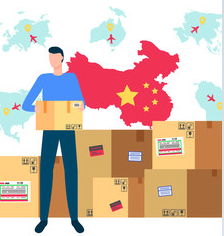
It can be a real challenge to maintain manufacturing activities in competitive, highly saturated industries, which is evident from the number of businesses that are at risk of closing due to massive overheads.
You can overcome these difficulties by outsourcing production activities that tend to consume significant time and resources. By doing so, you’ll free up time to focus on your core activities, those that directly contribute to your bottom line.
One technique that can be leveraged to great effect is contract manufacturing, but why should you be encouraged to import from China?
Contract Manufacturing: Why Select a Chinese Manufacturer?
As a substantial manufacturing hub of the world, China provides multiple opportunities for companies to secure cost-efficient business arrangements on large economies of scale.
Since cost is the biggest factor behind any business decision, working with a Chinese manufacturer is often a preferable option. Low prices are derived from low labour costs, the absence of VAT on orders, and China’s low-value, stable currency. All of these factors result in manufactured goods being available at a much lower price.
Outsourcing your manufacturing activities to a reliable contract manufacturer in China is a great idea, especially when you can reinvest the money you save into your core business functions.
How Do You Go About Selecting the Right Contract Manufacturer in China?
Here are some useful tips that will help you find a Chinese manufacturer that can capably meet your unique requirements:
Identify Production Needs
Contract manufacturing is a preferred method of reducing production overheads. However, it’s also a good option when:
- You want to produce high-quality products
- You want to capitalize on a wealth of knowledge and expertise
- You need more time/flexibility to focus on core activities
- You want to scale at a fast rate and reduce time-to-market
- You want to simplify your supply chain
Once you’ve identified your needs, you’ll be poised to work out the perfect deal with the right contract manufacturing partner.
Match the Supplier With Your Individual Needs
Having established the type of contract manufacturer that will work for you, it’ll be time to look for one that will meet your unique manufacturing requirements. For example, if you’re looking to import office furniture from China, you should look for a contract manufacturer with extensive, specific knowledge.
However, finding the right manufacturer without the experience and local knowledge necessary to make a well-informed decision can leave you in a tough predicament. That’s why working with a reputable sourcing agent can pay dividends, since they can leverage years of experience and relationships to strike up the perfect deal for you.
Sourcing agents can vet companies accordingly, coordinating a screening process while ensuring all legal requirements have been met. Your sourcing agent will match you with a supplier/manufacturer based on your production needs and budget, ensuring you have a stream of high-quality partners to choose from. This will eliminate a huge portion of the risk you’d experience from searching independently.
Conduct Due Diligence
Though your sourcing agent will possess the attributes necessary to properly screen contract manufacturing companies on the horizon, conducting your own due diligence will offer reassurance.
This process will require you to:
- Evaluate the company’s Google listing reviews and other feedback
- Check the company’s engagement on social media
- Analyze the company’s reviews on Amazon
- Contact old customers and request direct feedback
- Check the company’s legal and operational details
- Search for news articles referencing the company
Ask About the Production Process
Once you’ve shortlisted contract manufacturers you’d be happy to work with, you should contact them individually to ask a bit more about each of them. When doing so, remember to ask a combination of the following questions:
- How many years of experience do you have?
- Where are your factories?
- Could you name some clients you’ve worked with?
- What is your typical MOQ?
- What OEM agreement do you prefer?
- Can we receive a discount?
- What product inspection, quality compliance, and quality assurance systems do you implement?
- Do you own your intellectual property?
- How scalable are your production facilities?
- Where do you buy your materials?
- What would you do in the event of not meeting a quality or delivery deadline?
- How would you resolve disputes during our partnership?
You’d often benefit from granting your agent the permission to ask these questions, especially when they can break down cultural/language barriers and utilize considerable expertise.
Request a Sample
This is a great way to get an indication of what you can expect from your provider. Most manufacturers will be open to sharing samples such as completed products, raw materials, machinery/tooling, spare parts, and more. You might even be awarded the opportunity to virtually share a sample design, something that can make your life easier.
When assessing the samples you receive, it’s important to analyze color, texture, quality, functionality, ease of maintenance, durability, etc. You should receive samples within 2-3 weeks, by which time you can specify changes for any new samples, capitalizing on the option to receive multiple samples from the same supplier.
Draft An OEM Contract
Setting up an OEM contract is better than a purchase order, especially if you intend on placing multiple orders with the same manufacturer. When drafting up an arrangement with your contract manufacturer, you should consider:
- Production milestones & deadlines
- Branding
- Product re-ordering
- Raw material sourcing
- Marketing
- Duration of the partnership
- Payment & financing
- IP
- Advertising confidentiality
- Product warranty
Remain in Close Contact With Your Collaborator
In order to maintain a successful arrangement with your contract manufacturer, you must remain in regular contact with them. This is essential for keeping track of your production schedule, to ensure quality remains consistent, and to accommodate any changes that need to be made.
5 Tips For Optimizing Your Chinese Contract Manufacturing Agreement
Here are some great tips for making the most of your manufacturing agreement:
Prepare an Audit
Before drafting up an OEM agreement, you’d be wise to visit your contract manufacturer’s factories to ensure everything is as it’s been promoted. Despite Chinese manufacturers rarely lying about industry practices, performing a physical evaluation of a factory is a great way to know exactly what to expect.
Register Your Intellectual Property
Most contract manufacturers in China don’t have their own intellectual property, meaning you’ll need to register the intellectual property for your design process in China. This will ensure you retain your rights and are safeguarded against any potential lawsuits that could arise otherwise.
Save the Samples You Approve
Once you’ve approved samples sent from a contract manufacturer and you’re happy to proceed, keep the samples you’ve approved for later reference. You can use these to cross-verify future batches with the quality of your original sample, to make sure your partner is maintaining the standards that were set out in your original agreement.
Use Set Prices
If you have granted your contract manufacturer full responsibility, you should use a bill of materials including set, agreed-upon prices for each order. This is a great way to safeguard against prices being raised over time, where you can ensure your per unit price remains constant. Otherwise, you could fall victim to future price revisions.
Specify Ownership in Your OEM Contract
Clarify details about the ownership of any intellectual property like tools, machinery, and components needed to complete your product orders. By doing so, you can more effectively regain the products you’ve leased out to your contract manufacturer when your contract expires.
Summary
China is a great destination for contract manufacturing, where you can save a considerable amount of money without sacrificing quality. To enhance your Chinese collaboration further, working with a sourcing agent like HUACI Sourcing is a highly recommended option.
HUACI Sourcing can scale your business with elite sourcing services, promoting faster lead times, improved product quality, and better business scaling. Whether it’s sourcing the ideal contract manufacturer or shipping goods to your door, HUACI Sourcing can tackle a diverse range of sourcing requirements en route to a optimal outcome.
For more information on striking the best contract manufacturing deal, be sure to check out our Import from China to UK guide.





